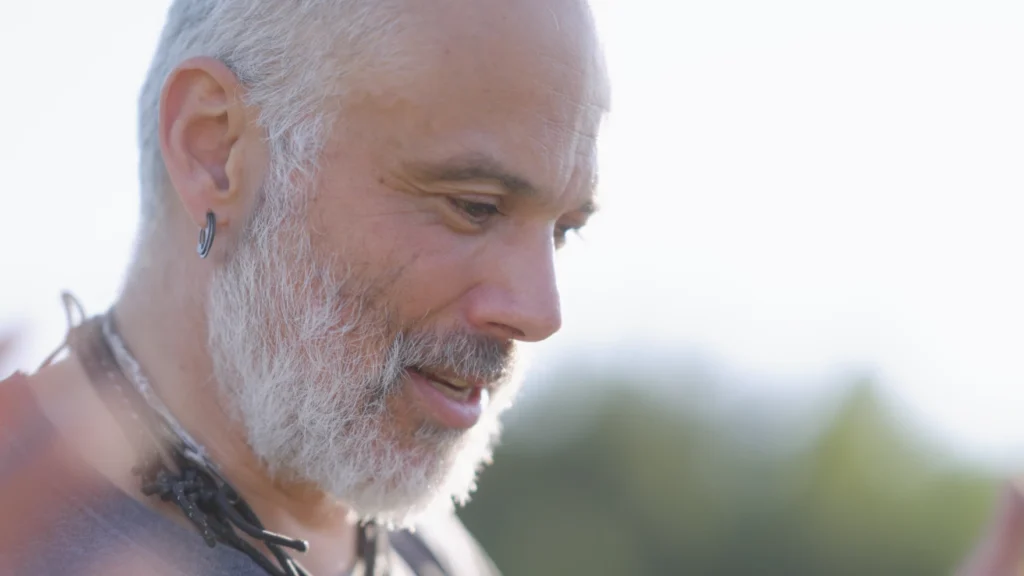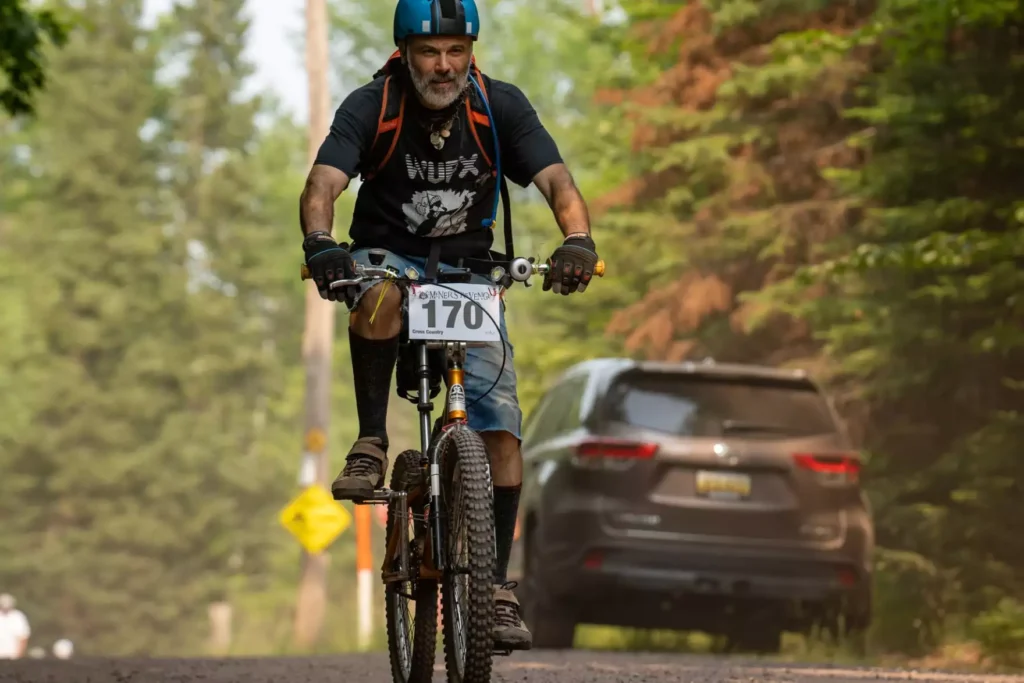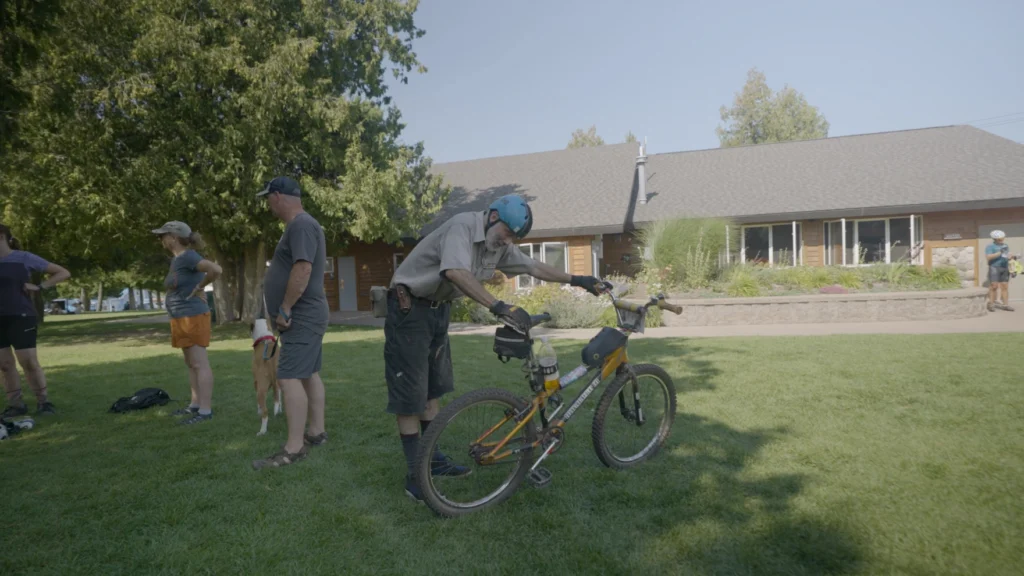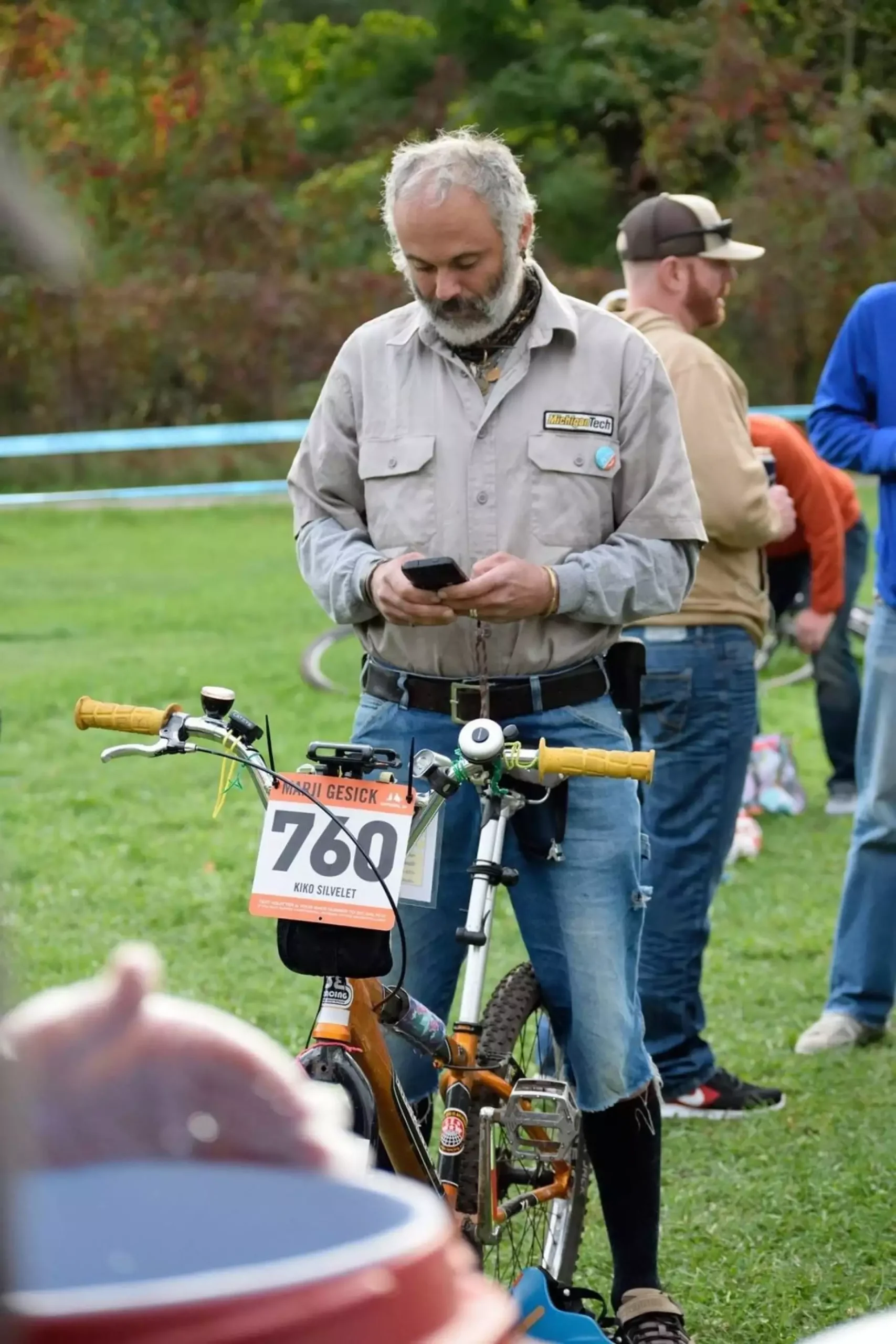The following transcript is from an episode of Points North, a narrative podcast about the land, water, and inhabitants of the Great Lakes. Listen to more episodes at pointsnorthpodcast.org.
Growing up in rural Brazil, Kiko Silvelet says bikes had a very specific purpose: transportation. But after seeing the movie “E.T. the Extra-Terrestrial” as a boy, Kiko convinced his parents to buy him a BMX bike – a very impractical bike.
Ever since then, Kiko has been in love with the BMX bike.
“The simplicity of it is just so beautiful,” he said. “And it’s really easy to get it right because there’s less to go wrong.”
Now he’s in his early 50s, and living in Michigan’s Upper Peninsula. He competes in these hardcore mountain bike races where riders are decked out in expensive gear with bikes that cost thousands of dollars. Kiko rides a used BMX bike he bought for $150 bucks. And he almost always finishes last. Why does he do it?
Credits
Host / Producer: Dan Wanschura
Additional Sound / Interviews: Aaron Peterson, Darryn Schulte
Editor: Morgan Springer
Additional Editing: Peter Payette, Ellie Katz
Special Thanks: Ryan Elders
Music: Rebel by Nick Percev, Punk and Americana by HoliznaCCO, and Let Go Gecko and Sandpiper in Motion by Blue Dot Sessions

Transcript
DAN WANSCHURA, BYLINE: Copper Harbor, Michigan is a mecca for mountain bikers in the Midwest. Today, hundreds of bikers are here to race. They’re gathered at the starting line.
P.A. ANNOUNCER: Five, four, three, two, one, go! (crowd cheering)
WANSCHURA: This sea of riders takes off. They’re decked out in expensive, skin-tight performance gear. And the mountain bikes they’re riding – a lot of them cost thousands of dollars. They’re tricked out with gears and suspension – meant to get them through the toughest terrain – trails that most people would be afraid of.
But there’s this one guy that stands out from everybody else. He’s kind of a rebel with a punk rock attitude.
WANSCHURA: What’s the word that comes to mind when you think of Kiko?
CHRIS SCHMIDT: Legend. Legendary. Nothing matters, it’s just he’s gonna get it done.
ELIZABETH MILLER: He’s always got that bike. You know, the iconic Kiko bike.
JAMES MORROW: I just look at him like a 16 year-old in an experienced body. Like, he’s just playing like we used to. It’s cool; it’s inspiring.
WANSCHURA: So, who is this legend?
KIKO SILVELET: My entire name is Henrique Arnaldo de Melo e Silva, which is a six part name.
WANSCHURA: Which is why most people call him Kiko Silvelet. And then there’s his bike.
NATHAN MILLER: He’s got this wacky BMX bike.
CHRIS SCHMIDT: Being able to get out there and push his BMX bike through whatever comes his way.
JAMES MORROW: He’s a lunatic on a BMX bike. And he gets it done on it.
WANSCHURA: If you don’t know what a BMX bike is – it’s a smaller bike – almost looks like a kids bike. You might see people riding it at the skatepark doing tricks or just around town.
Kiko bought his used for $150 bucks about 20 years ago. And he loves this thing. He calls it Glamour Girl.
KIKO: The simplicity of it is just so beautiful and it’s really easy to get it right because there’s less to go wrong.
WANSCHURA: Unlike the other bikes at this race, Kiko’s bike has no suspension. The tires are smaller. And it only has one gear. Which seems crazy cause he’s got 31 grueling miles ahead of him. Up and down hundreds of feet of rocky elevation. Sometimes bikers don’t even finish.
But that’s what Kiko’s after: finishing, not winning.
KIKO: When people are like, ‘Oh dude, you can’t do this race without suspension.’ ‘Oh, you need a 29 or 27.5,’ or whatever it is, ‘you gotta have full-suspension.’ And you get to thinking that and I’m like, ‘Watch this!’



WANSCHURA: This is Points North. A podcast about the land, water, and inhabitants of the Great Lakes. I’m Dan Wanschura. Today on the show, why Kiko Silvelet chooses his BMX bike over any other. That’s coming up right after this.
(sponsors)
WANSCHURA: Kiko Silvelet has always been a bit of a rule breaker. He grew up in rural Brazil where he says bikes were used for a very specific purpose.
KIKO: That was the transportation, you know – and you’d see families on these bikes. Women sitting side saddle on the rear, maybe a kid sitting side saddle on the top tube. And that’s how people got around.
WANSCHURA: But when he was 11 or 12, Kiko saw E.T. the Extra-Terrestrial for the first time. In the movie, there’s an epic bike chase scene.
(E.T. film scene)
Cops chase a group of kids who are on BMX bikes. Eventually, the kids escape and fly away on their bikes with E.T.
KIKO: And it’s just cool stuff, you know? It’s just like, ‘Oh, I want to do that,’ you know? ‘I want a bike like that,’ you know?
WANSCHURA: But the problem was BMX bikes aren’t very practical.
KIKO: My parents were like, there’s no way we’re going to buy you a BMX bike. Makes no sense.
WANSCHURA: But Kiko kept bugging them. Eventually, they came up with a compromise. His parents would buy him a BMX bike, if they put a basket on the front and a rack on the back.
KIKO: But the bike rack and the basket didn’t last too long on the bike, you know … after it was there for a little while, I got rid of it. Because it was the weirdest looking BMX bike ever with a rack on and a basket. I think I was just embarrassed more than anything.
WANSCHURA: Kiko rode mile after country mile on that little blue bike. He and his younger brother would wake up at 5 in the morning to get to school. And they’d bike part of the way there – between three and four miles.
KIKO: I’m going to guess, I don’t know, half-hour, 40 minutes to ride that, you know, big uphill in the beginning and then a slight downhill to come into the black top.

WANSCHURA: From there, they’d stash their bikes on the side of the road and either hitchhike or catch a bus another 13 miles or so.
Those long bike rides to school in Brazil ended in 1987 when Kiko’s dad encouraged him to come to the U.S. So, he came to Michigan as a high school exchange student. He was 15. When he graduated, he stayed.
Now, Kiko’s in his early 50’s. He’s married, has two kids, and works as a research engineer at Michigan Technological University.
And then, of course, he races his BMX on the side. He doesn’t really train for the races though. And he doesn’t wear that skin-tight performance gear either. Instead, he usually shows up in a work shirt … and cutoff jeans.
KIKO: Am I going to be faster if I wore all that gear? Hell no, I would feel uncomfortable and probably end up going slower, right?
(necklaces jingling)
That jingling you hear – that’s Kiko’s bling. He’s decked out in all these earrings and necklaces.
KIKO: I used to have normal earrings, but these are circlips and e-clips. You buy at a hardware store for a few cents each. … I probably got maybe a dollar worth of earrings right here.
(P.A. announcer)
WANSCHURA: It’s about three and a half hours into the cross-country bike race in Copper Harbor. Most of the riders have crossed the finish line at this point. But Kiko’s nowhere in sight.
P.A. Announcer: We still have quite a few people on the course. It looks like we might have 15, 16, 17 people still out there. Including one of our local legends, Kiko…
WANSCHURA: Kiko calls himself an agitator. He has opinions on a lot of different things including the latest and greatest bikes and gear.
KIKO: The bike industry, you know, the way it works, at least the way I see it, if they don’t come up with new stuff, they’re not going to make money because it’s about, ‘Hey, I gotta buy this new thing because it’s better.’ Are a lot of things better? You bet. But they also, there’s a lot of turnover to things just being different where they get to sell more because it’s different, right?
WANSCHURA: Some of the races Kiko competes in are even more challenging than this one. Races where many of the riders don’t complete the course. If they give up, they have to text the race organizer “quitter.”
KIKO: He made a comment that– he goes I got these people that buy $10,000 bikes and they’re texting me ‘quitter’ at some point, you know, they’re bailing out at some point. They’re trying to buy themselves into the race.
WANSCHURA: Kiko’s not trying to diss his fellow riders. But he says that approach isn’t necessary.
KIKO: You just gotta decide that you can do it. And I think that to me personally, opens up this whole world – not just around bikes or old cars or whatever it may be – about anything of like if you think about it, if you plan for it – you can do it. You can get it done.
Kiko Silvelet“You just gotta decide that you can do it. And I think that to me personally, opens up this whole world – not just around bikes or old cars or whatever it may be – about anything of like if you think about it, if you plan for it – you can do it. You can get it done.”
(sound of bike riders)
WANSCHURA: Two more hours have passed. Now it’s about five hours into the race. Just a handful of bikers are still on the course. But still, no sign of Kiko.
Near the end of the race, there’s a wicked trail section called Paul’s Plunge. It’s a steep downhill that’s full of rocks and tree roots. At this point in the race, some riders decide to just walk their bikes down it.
WANSCHURA: You’re almost there. BIKE RIDER: Almost. Whew, my legs are toast.
WANSCHURA: And finally there’s Kiko – and not walking. He’s still on his bike!
KIKO: I’m spent!
WANSCHURA: Yeah, what’s going through your mind right now, Kiko?
KIKO: Oh, I’m exhausted. … My ass got handed to me. I’m about to cramp up. My back hurts, but you know, here we go.
WANSCHURA: Kiko carefully rolls down Paul’s Plunge.A few minutes later, he picks up speed and races toward the finish line. One of my co-producers, Darryn Schulte, rides the final stretch with him.
KIKO: Oh, this was hard!
SCHULTE: Yeah, it’s a long ride!
KIKO: Yep, and I’m not last!
WANSCHURA: Out of 136 riders, Kiko is 132. His final time: five hours and 13 minutes.
KIKO: Oh, it’s good when it’s done. … I just want to stand here and do nothing.
DARYN: Yeah, what’s first on the list? You jumping in the lake, or what’s next?
KIKO: I don’t know. I’m just going to sit for a little bit. Because if I jump in the lake right now, I’d probably drown.
WANSCHURA: Kiko says his BMX bike – Glamour Girl – performed awesome on the trail. He would hate to ride anything else.
KIKO: I just love that I can do it. … Because I think my expectations are different than other people’s expectations.
WANSCHURA: Expectations that were shaped from growing up in Brazil.
KIKO: What they did with what they had is nothing compared to the bike ride that I’m doing here. You get it? This is deluxe. This is plush and I’m not talking bike-ride specific, I’m just talking life. This is nothing. This is nothing. … I’ve been places where they’re doing just as much with a lot less. So being on a little– on my BMX bike– it really isn’t a whole lot at all. At all.
WANSCHURA: So like Kiko says, just get out there and do it.
